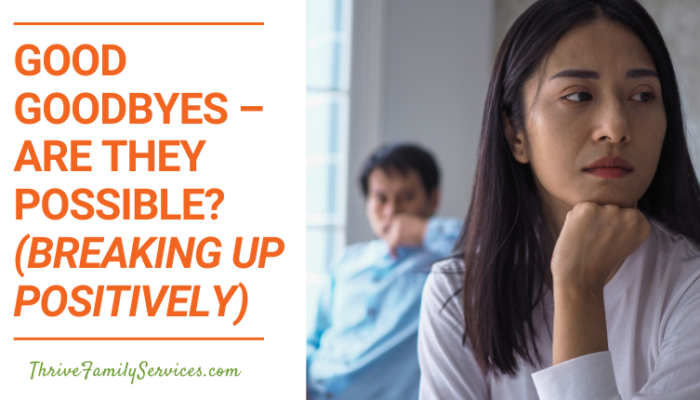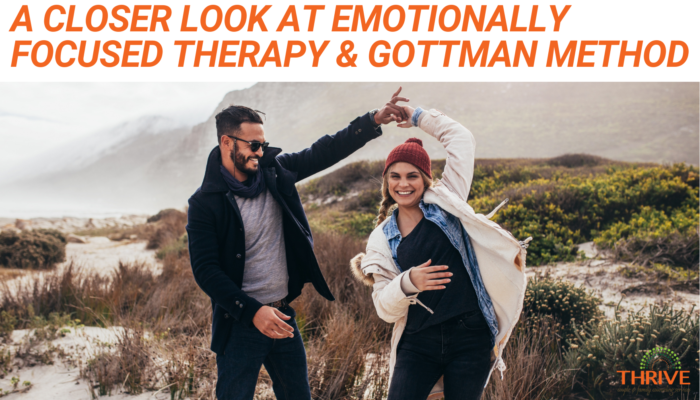When two people get together for a committed relationship, they don’t usually plan on breaking up. The thought of divorce or separation or the end of the relationship just is not a thought that most people want to consider. After all, people naturally want to form close connections with others. It is one of our most basic needs.
When you realize that your relationship isn’t something you want to continue, it can be a devastating and difficult conversation to have. Even after the conversation, taking the steps needed to transition out of being in a relationship with your partner can be heart-wrenching and messy.
Not All Break-Ups Are The Same
Relationships end for a variety of different reasons:
- Betrayals, like infidelity or other secrets
- Substance use or addiction
- Incompatible personality traits
- Disagreements on lifestyle, like spending money or having kids
- Abuse or violence
- Fading feelings of attraction, connection, or enjoyment
In other words, sometimes relationships end due to the circumstances, not because the romantic feelings have gone away. Other times, relationships end with partners having neutral feelings towards each other. There are also relationships that end with lots of hurt, pain, or hatred between partners.
Sometimes the end of a relationship involves kids or pets, sometimes the end of a relationship involves one or both partners having to change their living situations, and sometimes relationships end with a “clean break.”
Regardless of the reason why your relationship is ending – or what events might happen once it is over – breaking up isn’t easy. You might be worried about feelings (yours or your partner’s), anxious about starting a conflict, or apprehensive about the bigger logistical issues, like custody.
These fears about breaking up – and others – are all perfectly valid fears to have.
Couples Therapy for a Good Goodbye
It could also be helpful to note that couples therapy is a great resource to use for co-creating a good goodbye.
Believe it or not, couples counseling is a resource to help support the relationship in whatever capacity that support entails. Therapy gives couples the chance to make a well-examined decision about whether they want to stay or leave. For some relationships, the therapist is asked to fight for the relationship’s survival. However, other relationships need the therapist to support them through a goodbye in a healthier way.
However, the truth of the matter is: Ending a relationship doesn’t have to be any more miserable or hard than they already are. If you have kids, there are ways to end the relationship so they don’t get hurt. If you live together or have pets, there are ways to end the relationship as pain-free as possible. If you just want to split and have no reason to ever have contact with this person again, there are ways to end the relationship with respect, dignity, and compassion.
So what are the rules to having a “good goodbye?” How is that even possible? What does breaking up positively look like?
Ten Things to Remember When Breaking Up
1. Be honest about why it is happening
It’s important to be honest with both yourself and with your partner about why the relationship is ending. Without fully understanding why the relationship is ending, it can be harder to not fall back into the relationship. Not understanding why it’s ending can be harder on both partners’ mental health. Also, having this insight gives both people the awareness to grow individually or in their next relationship.
2. Own your part of the relationship’s demise
It can feel tempting to feel blame towards your partner or shame towards yourself when your relationship ends. Depending on the situation that led to the decision to break up, there can be a lot of strong or mixed messages between partners or even within yourself. Taking responsibility for your contribution is a healthy way to make sense of what happened.
3. Be clear about what the relationship gave you
Just because you are breaking up does not mean that your partner is a completely bad person or that the relationship had nothing good about it. After all, partners pair up together for a reason. Remember the good parts of the relationship. Remember the things you liked about your partner. Then, reflect on what you are taking away from it.
4. Remember your needs when breaking up
Take care of yourself – breaking up is hard! Losing someone that you had an attachment to can feel distressing. Listen to your emotions and your body to notice what they are telling you. Let this be a space to validate the difficulty of the end of a relationship and use it as permission to take care of yourself!
5. Have a support system in place
It is important to have friends or family members in your life to support you through the end of your relationship. Many folks rely on their partner for emotional support when they are in a relationship. Transitioning your emotional support system from your partner to other people is an important part of a successful goodbye.
6. Allow yourself to grieve or feel angry after breaking up
Don’t bottle up emotions in an effort to “move on.” It is a lot more beneficial in the long run to let yourself move through whatever emotions feel relevant to you. Emotions can only heal if they are allowed to move through their full cycle. Name your emotion, let yourself feel it, talk about it… just don’t suppress it. It will only pop back up later.
7. Answer questions from your partner
It is important to have a cohesive story about how your relationship got to its end, especially if your relationship involves children. If possible, answer questions honestly and truthfully that your partner may ask about the relationship and its end.
Asking and answering questions about what happened to the relationship and why helps both partners develop a cohesive story that can be shared with other people who care about you, your partner, and the relationship. This is most true with children who will want to know why the relationship is ending. Share this story in an age-appropriate way.
8. Don’t be afraid to get help for logistics like assets and custody
Although there is often emotional distress associated with breaking up, there can also be some tricky logistical steps that can feel overwhelming and distressing. If you and your partner share housing, children, pets, bank accounts, or other assets, don’t be afraid to ask for help or advice from professionals. It’s okay to ask for help from a mediator, therapist, or another professional to make this part of the goodbye easier.
9. Know your boundaries and clearly share them
Depending on the reason why the relationship ended and the longevity of the relationship, different people need different things. Having clear boundaries in place between partners can make the expectations of how to move forward easier. For example, if your ex-partner is reaching out to you at a frequency that is hard for you, it can be a good idea to set a clear boundary about what your expectations and needs are around communication.
10. Learn from your mistakes to not repeat cycles
Relationship patterns tend to replicate across partners. That is, if you don’t understand why you and your partner’s negative cycle existed, you are likely to repeat it with future partners. This is where a therapist can help. Learn about yourself, your attachment history, and other factors that influence the way you show up as a partner. That way, after you’ve said a “good goodbye,” you can work on setting yourself up for future relationship success.
If you need support in breaking up positively in your relationship, our Greenwood Village Couples Counselors can help you come up with a plan that works for everyone.




